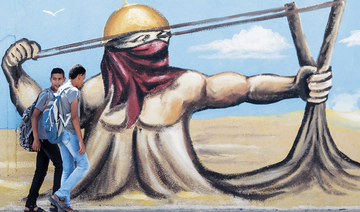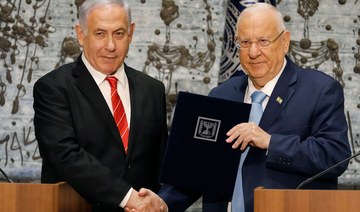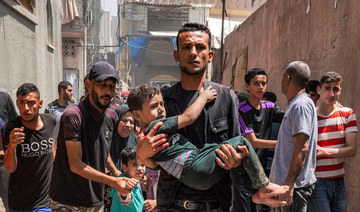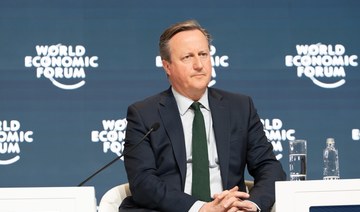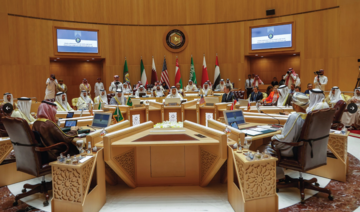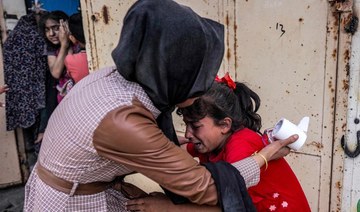JERUSALEM: Benjamin Netanyahu has been tasked by Israel’s president to form a new government for the sixth time in his lengthy political career. This time it’s no mere formality, but rather a daunting endeavor that looks like mission impossible.
After an inconclusive national election last week, Netanyahu has no obvious path to the 61-seat parliamentary majority required of a coalition government, enjoying the backing of just 55 of its 120 members. It doesn’t look like his opponents are going to budge and next week Netanyahu has a pre-indictment hearing before he will likely be charged in a series of corruption scandals — something that would reshuffle the extremely complicated deck he already has.
Officially, Netanyahu has up to four weeks to present a stable government. President Reuven Rivlin, who is responsible for delegating a leader to form a government, gave Netanyahu the nod because he deemed him to have the best odds of success.
Rivlin can technically extend the window by two weeks, as he did after April’s initial election, but given the current quagmire, Netanyahu is far more likely to return the “mandate” to the president well before then if no breakthrough emerges. Rivlin can then give challenger Benny Gantz a four-week window to try it himself. With only 54 members backing Gantz, he has an equally slim chance of success, which is why Rivlin has been urging the two men to reach some form of unity government to spare the country a dreaded third election in less than a year.
Here’s a look at how it can play out:
LIEBERMAN FOLDS
The impetus for last week’s unprecedented repeat election was maverick politician Avigdor Lieberman. A former aide and ally of Netanyahu’s, he refused to join his government in April because of what he considered to be the excessive influence of its ultra-Orthodox Jewish parties. Lieberman emerged even stronger in last week’s vote with eight seats. Refusing to endorse either candidate, he has stood firm on his demand for a secular unity government between the two major parties, Likud and Gantz’s Blue and White. The simplest way out of the impasse would be a Lieberman flip-flop that would save Netanyahu and give him a solid majority. But the one-time protégé appears bent on taking down his former mentor. The battered Labor party and its six seats could also potentially offer Netanyahu a lifeline, but that seems like even more of a long shot.
LIKUD OUSTS NETANYAHU
The main sticking point for Gantz and his centrist Blue and White party is Netanyahu himself. Gantz, a former military chief, has repeatedly vowed he would not ally with a prime minister facing such serious criminal charges . But he’s openly called for a unity government with a Likud party headed by someone else, which would offer the prospect of a broad, stable coalition. An open rebellion is unlikely in a party that values loyalty and has only had four leaders in its 70-plus years of existence. Netanyahu is not only clinging to office for his political survival but also to protect himself as much as he can from prosecution, so he won’t go down without a fight. Unlike a regular Cabinet minister, Netanyahu as prime minister would not be required by Israeli law to step down if he was charged. Still, he will likely face heavy pressure to do so. He still enjoys wide backing in Likud, where he is revered almost like royalty, but if the party sees polls predicting a dramatic downfall in a third round of voting, the long-anticipated uprising could finally start to materialize.
BIBI AND BENNY COMPROMISE
During the ugly campaign, Gantz questioned Netanyahu’s patriotism and Netanyahu questioned his sanity. But in the blood sport that is Israeli politics, such insults are nothing that can’t be overcome. A unity government, with a rotating leadership, still appears to be the most plausible way out of the gridlock. Upon appointing Netanyahu prime minister-designate, Rivlin proposed a plan in which both parties would have equal power and Gantz would become prime minister if Netanyahu became legally “incapacitated” within the next year. Likud indicated it was open to the proposal, but Gantz has recanted for now — apparently under pressure from the more anti-Netanyahu forces in his faction. With the clock ticking, he may reconsider.
A WILD CARD EMERGES
If neither Netanyahu nor Gantz can muster a majority coalition, there is a never-before-used loophole in Israeli law that would allow any lawmaker a three-week period to recruit a 61-seat majority around them. That hypothetical candidate would likely have to come from the right, with the hottest name being former Education Minister Gideon Saar of the Likud. He’s long been considered a potential successor to Netanyahu, despite their rocky relationship. Though a hard-liner, he enjoys a good reputation across the political spectrum, and he seems more of a unifier than Netanyahu. Knesset speaker Yuli Edelstein and Cabinet Minister Gilad Erdan have also been floated as potential heirs. But that would require bypassing Netanyahu and figuring out how to get the rest of Likud’s would-be claimers to the throne to rally around a single candidate.
ELECTIONS, TAKE THREE
Each passing day makes the most undesirable outcome appear more likely. No one in the political system favors a third election and the public will certainly be disgusted by another costly, divisive campaign that will just further extend over nine months of government paralysis. Another vote is unlikely to produce a more decisive result, and both sides are already preparing to blame the other for dragging the country through the mud once again. As Rivlin warned, it will be the public who pays the price for it.
“This is a bad situation in a sense that the country must be run by an effective government,” said Gideon Rahat, a Hebrew University professor and senior fellow at the non-partisan Israel Democracy Institute. “On the other hand, if we do cope with these problems, if we continue to fulfill the rules of the game ... this at least will tell you that Israeli democracy still operates, more or less, even though there is kind of a crisis.”
Israeli politics remain in chaos after deadlocked election, as Netanyahu struggles to form coalition
Israeli politics remain in chaos after deadlocked election, as Netanyahu struggles to form coalition
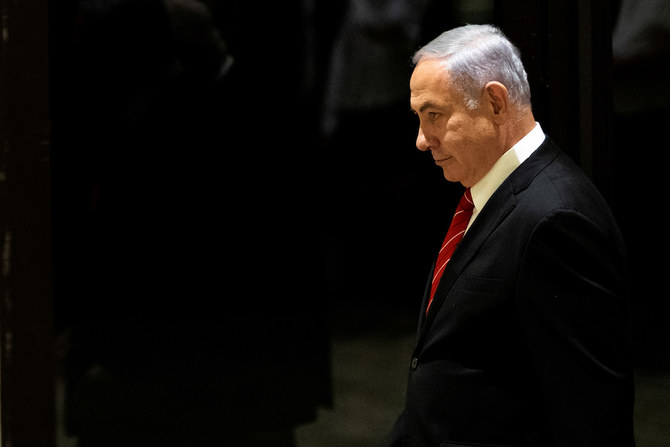
- He has up to 6 weeks to attempt to resolve the political impasse
- If Netanyahu fails to form a government, the president can then ask Gantz to try
Israel police say Turk shot dead after stabbing officer in Jerusalem

Police said that a “terrorist armed with a knife arrived in the Old City of Jerusalem, on the Herod’s Gate Ascent street, charged at a border police officer and stabbed him with a knife.”
It said another officer at the scene “neutralized the terrorist” and the attacker was later pronounced dead.
Netanyahu vows to invade Rafah ‘with or without a deal’ as ceasefire talks with Hamas continue
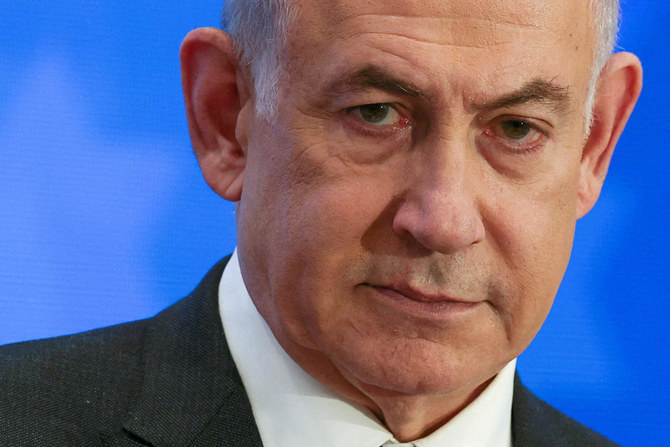
- Netanyahu said Israel would enter Rafah to destroy Hamas’ battalions there “with or without a deal”
- The international community have raised an alarm over the the fate of civilians in Rafah
TEL AVIV: Israeli Prime Minister Benjamin Netanyahu pledged Tuesday to launch an incursion into the southern Gaza city of Rafah, where hundreds of thousands of Palestinians are sheltering from the 7-month-long war.
Netanyahu said Israel would enter Rafah to destroy Hamas’ battalions there “with or without a deal.” Israel and Hamas are negotiating a ceasefire agreement meant to free hostages and bring some relief to the Palestinians in the besieged enclave.
“The idea that we will stop the war before achieving all of its goals is out of the questions. We will enter Rafah and we will eliminate Hamas’ battalions there — with a deal or without a deal, to achieve the total victory,” Netanyahu said in a meeting with families of hostages held by militants in Gaza, according to a statement from his office.
Netanyahu has vowed to achieve “total victory” in the war and has faced pressure from his nationalist governing partners to launch an offensive in Rafah, which Israel says is Hamas’ last major stronghold.
Hopes have risen in recent days that the sides could move toward a deal that would avert an Israeli incursion into Rafah, where more than half of Gaza’s 2.3 million population are sheltering.
The international community, including Israel’s top ally, the US, have raised an alarm over the the fate of civilians in Rafah if Israel invades.
Netanyahu has repeatedly rejected stopping the war in return for hostage releases, and says an offensive on Rafah is crucial to destroying the militants after their Oct. 7 attacks on Israel triggered the conflict. His government could be threatened if he agrees to a deal because hard-line Cabinet members have demanded an attack on Rafah.
Blinken heads to Jordan to push Gaza aid
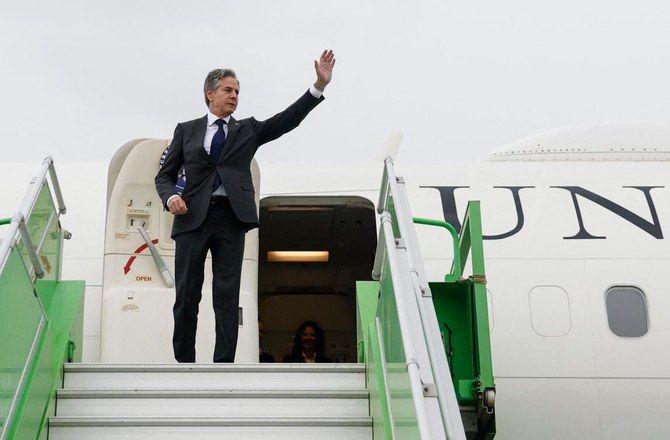
- Blinken flew to Amman after talks with Gulf Arab leaders in Riyadh
- The US top diplomat will meet Jordan’s King Abdullah II and Foreign Minister Ayman Safadi
RIYADH: US Secretary of State Antony Blinken headed Tuesday to Jordan where he will discuss ways to boost aid deliveries into Gaza and quietly thank the kingdom for its help during recent Iran-Israel clashes.
Blinken flew to Amman after talks with Gulf Arab leaders in Riyadh, part of his seventh tour of the region since the October 7 attack by Hamas on Israel.
The US top diplomat will meet Jordan’s King Abdullah II and Foreign Minister Ayman Safadi as well as the UN humanitarian aid and reconstruction coordinator for Gaza, Sigrid Kaag.
Later in the day, Blinken will head to Israel where he will discuss the latest negotiations aimed at securing a temporary ceasefire and a release of hostages.
President Joe Biden’s administration, despite criticism abroad and rising fury on US university campuses, has supported Israel in its relentless campaign against Hamas but also urged its ally to do more to protect civilians.
“President Biden has insisted that Israel take specific, concrete, measurable steps to better address humanitarian suffering, civilian harm and the safety of aid workers in Gaza,” Blinken told Gulf Arab foreign ministers in Riyadh on Monday.
“We have seen measurable progress in the last few weeks, including the opening of new crossings, an increased volume of aid delivery to Gaza and within Gaza, and the building of the US maritime corridor, which will open in the coming weeks,” Blinken said.
“But it is not enough. We still need to get more aid in and around Gaza,” he said.
Biden warned Israel that future support was at stake after an April 1 Israeli strike killed seven aid workers from World Central Kitchen, the charity founded by celebrity Spanish-American chef Jose Andres.
The United States said that Israel has since taken steps to avoid such deaths in the future, including coordinating more directly with aid groups working in Gaza.
But the situation remains dire in Gaza, where the vast majority of residents have fled their homes and the United Nations has warned of looming famine.
The Biden administration is addressing the crisis by building a temporary pier to bring in aid, an extraordinary step to deal with concerns about a friendly country and major recipient of US assistance.
Jordan, which has diplomatic relations with Israel and a large Palestinian population, is especially sensitive to tensions in the Palestinian territories.
Earlier in April, Jordan shot down Iranian drones fired at Israel in response to a deadly air strike on the Iranian consulate in Syria.
Jordan, while working with the United States, has insisted that it does not want to be caught in the middle of the conflict.
Houthis claim attack on Greek merchant vessel off Yemen
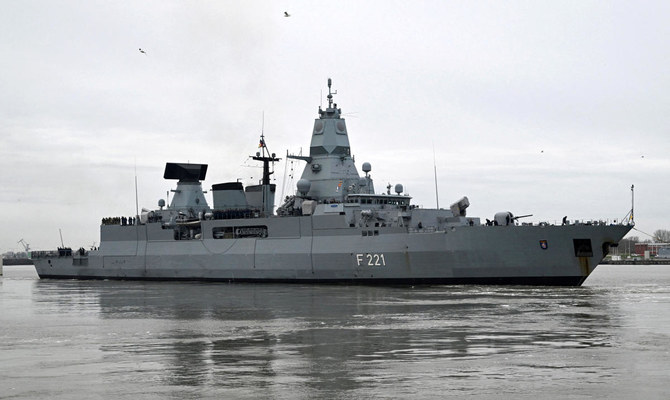
- Houthis had targeted MV Cyclades with three anti-ship ballistic missiles and three drone strikes
- Earlier, the UKMTO reported explosions near a commercial ship sailing off the Yemeni coast northwest of Mokha
DUBAI: Yemen’s Houthis claimed responsibility for attacks on Monday along the Red Sea shipping route, including on a Greek commercial vessel, according to a British maritime agency and the US military.
The US Central Command, or CENTCOM, said the Houthis had targeted MV Cyclades, a Greek commercial vessel flying the Maltese flag, with three anti-ship ballistic missiles and three drone strikes.
“Initial reports indicate there were no injuries and the vessel continued on its way,” CENCOM posted on X, formerly Twitter.
Earlier, the UK Maritime Safety Agency (UKMTO) reported explosions “in close proximity” to a commercial ship sailing off the Yemeni coast northwest of Mokha.
“Vessel and crew are reported safe,” the agency, run by the Royal Navy, added.
Maritime security firm Ambrey said the Malta-flagged container ship was en route from Djibouti to Jeddah and was likely targeted “due to its listed operator’s ongoing trade with Israel.”
Houthi militia claimed responsibility for firing at the Cyclades, MSC Orion and two US vessels.
The Iran-backed group, which controls the Yemeni capital Sanaa and much of the country’s Red Sea coast, has launched a flurry of attacks against ships since November.
It says their campaign is in solidarity with Palestinians amid the Gaza war.
CENTCOM also said that US forces shot down an unmanned aerial vehicle (UAV) over the Red Sea on Monday morning as it was headed on a flight path “toward USS Philippine Sea and USS Laboon.”
“The UAV presented an imminent threat to US, coalition, and merchant vessels in the region,” it wrote on X, adding that there had been no injuries or damage reported by US forces or nearby commercial ships.
Since January, the United States and Britain have launched repeated strikes on Houthi targets in Yemen in response to the ship attacks.
Hamas prepares response to Gaza truce offer
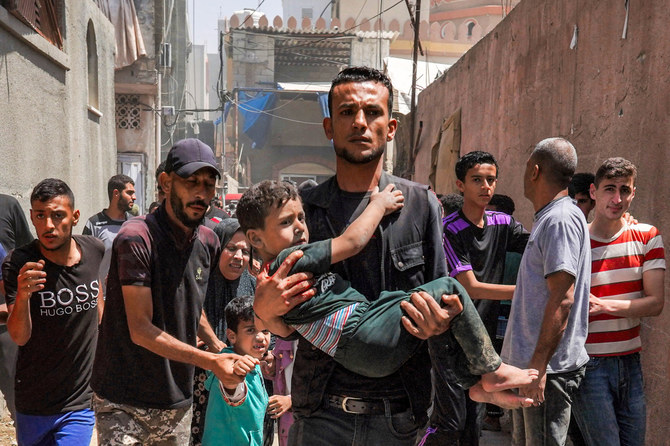
- Returning to Qatar after the latest talks in Cairo, the Hamas delegation said it would “discuss the ideas and the proposal”
JERUSALEM: Hamas was studying Tuesday Israel’s offer of a 40-day truce in the war in the Gaza Strip in exchange for the release of scores of hostages held since the Palestinian militant group’s October 7 attacks.
Returning to Qatar after the latest talks in Cairo, the Hamas delegation said it would “discuss the ideas and the proposal... we are keen to respond as quickly as possible,” a Hamas source told AFP on condition of anonymity.
Egyptian sources told Al-Qahera News, a site linked to Egyptian intelligence services, that the Hamas delegation would “return with a written response.”
US Secretary of State Antony Blinken described the truce terms as “extraordinarily generous,” while the White House asked fellow mediators Egypt and Qatar to increase pressure on Hamas to accept the latest push to halt the nearly seven-month-old war.
According to Monday night call readouts, US President Joe Biden urged the Egyptian and Qatari leaders “to exert all efforts to secure the release of hostages held by Hamas,” calling this “the only obstacle” to securing relief for civilians in the besieged strip.
For months, Egypt, Qatar and the United States have been trying to secure a new agreement between the combatants. A one-week truce in November saw 80 Israeli hostages exchanged for 240 Palestinians held in Israeli prisons.
Relentless Israeli bombardment has meanwhile devastated Hamas-run Gaza, flattening much of the territory and bringing its people to the brink of famine, while threatening to unfurl into a wider regional conflict.
In the far southern city of Rafah, Palestinians despaired over the war while searching for victims of the latest strike.
“Civilian individuals with no ties to Hamas or any other group were struck by a rocket, torn apart,” Um Louay Masri said at a destroyed building where children were being pulled out from underneath the rubble. “Why did this occur?“
To global alarm, Israel has vowed to go after Hamas battalions in Rafah, where the majority of Gaza’s 2.4 million people have sought refuge.
But Foreign Minister Israel Katz said over the weekend the government may “suspend” that operation if a truce is reached.
Blinken’s Mideast tour
Speaking in Riyadh on his seventh visit to the region since the start of the war in Gaza, top US diplomat Blinken underscored the need for Hamas to “decide quickly” on the truce.
He told a World Economic Forum special meeting that he was “hopeful that they will make the right decision.”
At the WEF meeting, Egypt’s Foreign Minister Sameh Shoukry said “the proposal has taken into account the positions of both sides.”
“We are hopeful,” he added.
British Foreign Secretary David Cameron said that Hamas has been offered a “sustained 40 days’ ceasefire, the release of potentially thousands of Palestinian prisoners, in return for the release of these hostages.”
On the sidelines of the WEF, US, European and Arab representatives met to discuss how to advance a two-state solution to the Israeli-Palestinian conflict.
Saudi Foreign Minister Prince Faisal bin Farhan told the gathering that tangible and irreversible steps toward establishing a Palestinian state would be an essential component of any durable ceasefire deal.
To incentivise Israel to support a Palestinian state, Washington has pushed the prospect of normalized Israel-Saudi relations, with Blinken suggesting Monday that some progress was being made in that arena.
Israeli Prime Minister Benjamin Netanyahu is a long-standing opponent of Palestinian statehood however, and Israel has previously rejected a permanent ceasefire.
A Hamas source has told AFP the group is keen for a deal that “guarantees a permanent ceasefire, the free return of displaced people, an acceptable deal for (a prisoner-hostage) exchange and an end to the siege” in Gaza.
Mounting pressure
Netanyahu is under tremendous pressure from the families of hostages taken by Hamas in the October 7 attack to secure their release.
On Monday, the families of two Israeli captives seen alive in a video released by Hamas last weekend called for their release.
“I demand the leaders of the free world to help us bring our people home,” said Aviva Siegel, who was freed in the November truce and is the wife of captive Keith Siegel.
Israel estimates 129 hostages remain in Gaza, including 34 believed to be dead.
Hamas’s attack resulted in the deaths of about 1,170 people in Israel, mostly civilians, according to an AFP tally based on Israeli official figures.
Israel’s retaliatory offensive has killed at least 34,488 people in Gaza, mostly women and children, according to the health ministry in the Hamas-run territory.
That tally includes at least 34 deaths in a 24-hour window, the ministry said Monday, down from a peak this month of at least 153 deaths on April 9.
At Rafah’s Al-Najjar hospital, a crowd of grief-stricken relatives jostled over the dead, shrouded in white.
“We demand the entire world to call for a lasting truce,” Abu Taha said at the hospital.
Access of aid
After an Israeli drone strike in early April killed seven workers from a US-based charity, Biden suggested to Netanyahu, for the first time, that continued US support could be conditional on protection and aid for civilians.
On Sunday, the White House said Israel was letting more aid trucks into Gaza in line with “commitments” Biden asked it to meet.
The UN has, however, continued to cite “access constraints” that significantly hinder delivery.
The US military is building a pier to help boost humanitarian supplies — an effort that the Pentagon on Monday said would cost Washington at least $320 million.
The UN has warned a heatwave and the proliferation of insects are increasing the risk for diseases at the swelling tent cities in Gaza.
“I have sick children who cannot tolerate the heat,” said Alaa Al-Saleh, a Palestinian displaced to an encampment in Rafah. “We are cramped inside the tent, rarely going outside.”



